|
|
|
Sort Order |
|
|
|
Items / Page
|
|
|
|
|
|
|
| Srl | Item |
| 1 |
ID:
132781
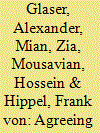

|
|
|
|
|
| Publication |
2014.
|
| Summary/Abstract |
Iran is negotiating with a group of six states over the future of its nuclear program. In November 2013, Iran and the P5+1 (China, France, Germany, Russia, the United Kingdom, and the United States) agreed to a Joint Plan of Action that seeks to reach a "comprehensive solution" by July 20, 2014.
The goal is an agreement on a set of measures that can provide reasonable assurance that Iran's nuclear program will be used only for peaceful purposes and enable the lifting of international sanctions imposed on Iran over the past decade because of proliferation concerns.
A key challenge is to reach agreement on limiting Iran's uranium-enrichment program, which is based on gas centrifuges, in a way that would enable Iran to meet what it sees as its future needs for low-enriched uranium (LEU) fuel for nuclear research and power reactors while forestalling the possibility that this program could be adapted to quickly produce highly enriched uranium at levels and in amounts suitable for use in nuclear weapons
|
|
|
|
|
|
|
|
|
|
|
|
|
|
|
|
| 2 |
ID:
106850
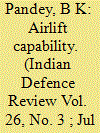

|
|
|
| 3 |
ID:
121760
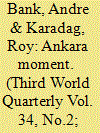

|
|
|
|
|
| Publication |
2013.
|
| Summary/Abstract |
Around 2007 Turkey became a regional power in the Middle East, a status it has maintained at least until the outset of the Arab Revolt in 2011. To understand why Turkey only became a regional power under the Muslim akp government and why this happened at the specific point in time that it did, this article highlights the self-reinforcing dynamics between Turkey's domestic political-economic transformation in the first decade of this century and the advantageous regional developments in the Middle East at the same time. It holds that this specific linkage-the 'Ankara Moment'-and its regional resonance in the neighbouring Middle East carries more transformative potential than the 'Washington Consensus' or the 'Beijing Consensus' so prominently discussed in current global South politics.
|
|
|
|
|
|
|
|
|
|
|
|
|
|
|
|
| 4 |
ID:
121500
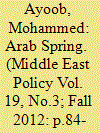

|
|
|
| 5 |
ID:
131848
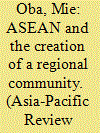

|
|
|
|
|
| Publication |
2014.
|
| Summary/Abstract |
After the ASEAN Concord II called for the building of an ASEAN Community in 2003, the creation of an ASEAN Community became a concrete part of the political agenda for the nations of Southeast Asia, and an ASEAN Community is scheduled to be created in 2015. However, it will all be for naught if the ASEAN Community that is established does not truly contribute to the stability and prosperity of the region. From this point of view, the article will attempt to evaluate the development of an ASEAN community concept and efforts to create it. To clarify the ideal of a true community, this article will take up Karl Deutsch's concept of "pluralistic security communities" and reconsider what a community requires. The article will state that the efforts to create an ASEAN Community should not be underestimated, and the blueprints for the creation of the ASEAN Community outline the formation of a true regional community. It will, however, conclude that in reality there exist factors within the ASEAN region that may shake the development of an ASEAN Community. It has to be said that the fostering of a sense of community at the level of ordinary people, as well as the creation of a community in which fundamental values and norms are shared, are distant propositions.
|
|
|
|
|
|
|
|
|
|
|
|
|
|
|
|
| 6 |
ID:
130178
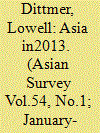

|
|
|
|
|
| Publication |
2014.
|
| Summary/Abstract |
Asia in 2013 Was Above all a year of ironies, a year of prosperity and growth accompanied by nationalist pensions an dressing dissatisfaction. It was also rebuilding year following a year of major transitions. Characteristically the targetofgreatnaturaldisasters,duringtheyearTyphoonHaiyanafflicted 6,000 fatalities on the Philippines while Sumatra's widen fire haze(the biggest in 15 years) be fogged Singaporean Malaysia. Yet, amid all these disconcerting changes, Asians s could take comfort in certain continuities.
|
|
|
|
|
|
|
|
|
|
|
|
|
|
|
|
| 7 |
ID:
121408


|
|
|
|
|
| Publication |
2013.
|
| Summary/Abstract |
During the 2001-2009 period when American foreign policy was internationally unpopular and perceived as unilateral, many states strengthened their security cooperation with the United States and facilitated the reach of the us military. This behavior spans a range of actions along a spectrum from reaffirming traditional alliances to far more subtle forms of alignment. This pattern is in large part driven by the actions of regional powers such as Russia and China whose rising power pushes neighboring states to seek the assurance of the United States, and it has distinct implications for the endurance of American hegemony. As those regional powers seek to expand their influence, secondary states may increase their contributions to the maintenance of American hegemony, thus helping to extend it well into the future. They are less prone to do so, however, if the United States follows a strategy of restraint that calls into question its willingness to defend its hegemony. Therefore, a policy focused on maintaining American military preeminence and the demonstrated willingness to use it may be what sustains the cooperation from second-tier states that helps to maintain American hegemony.
|
|
|
|
|
|
|
|
|
|
|
|
|
|
|
|
| 8 |
ID:
114245
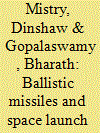

|
|
|
|
|
| Publication |
2012.
|
| Summary/Abstract |
International security concerns about ballistic missile proliferation have frequently highlighted the links between ballistic missiles and space launch vehicles. This article examines the extent of these links through a comprehensive survey of ballistic missile and space rocket programs in regional powers. It notes that missiles were derived from existing space launchers in just a small fraction of these cases. In a slightly greater fraction, space launchers were drawn from existing missile programs. This analysis suggests that though security concerns about space launchers being used as ballistic missiles are valid, the reverse trend, that of ballistic missiles being used as space launch vehicles, cannot be ignored. At the same time, as long as regional powers are limited to short-range and medium-range systems, their missile and space projects would only raise limited missile proliferation and space security concerns.
|
|
|
|
|
|
|
|
|
|
|
|
|
|
|
|
| 9 |
ID:
121249


|
|
|
|
|
| Publication |
2013.
|
| Summary/Abstract |
In August 2011 the Turkish prime minister Tayyib Erdogan arrived in
Somalia with a substantial delegation consisting of his family, ministers, and
civil society activists, along with Turkish celebrities, to highlight the need for
greater famine relief. In Mogadishu, Erdogan declared that the tragedy of
Somalia is a test of civilization and contemporary values.1
For any long-term
observer of Turkish interest in Africa, this visit seemed natural-an upshot
of Turkey's aspiration to become a regional power that "displays a superiority
in terms of power capabilities and exerts influence on shaping the regional
order."
2
|
|
|
|
|
|
|
|
|
|
|
|
|
|
|
|
| 10 |
ID:
189519


|
|
|
|
|
| Summary/Abstract |
Cyprus has featured prominently on Turkey’s foreign policy agenda in recent years. The ruling Justice and Development Party (AKP) has weaved this long-standing issue into a broader narrative of ‘geographical imagination’. Cyprus policy has thus reflected the AKP’s socio-political vision of a ‘Yeni Türkiye’ (New Turkey), first articulated nearly a decade ago, in which well-entrenched narratives about national identity and the Cyprus conflict are central. Against this backdrop, Cyprus has been leveraged in the twin interests of AKP survival (boosting incumbency through nationalist appeals) and Turkey’s regional power aspirations. The present article offers a timely survey of Turkey’s Cyprus policy over a 15-year period from 2002 (when the AKP rose to power) until the failure of the negotiation talks on Cyprus in Crans-Montana, Switzerland in July 2017. In so doing, the article charts the important continuities as well as the key markers of transition in Ankara’s policy towards Cyprus under the AKP.
|
|
|
|
|
|
|
|
|
|
|
|
|
|
|
|
| 11 |
ID:
144697
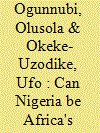

|
|
|
|
|
| Summary/Abstract |
Does the reference to regional hegemony in the African context apply to Nigeria? This study examines this question in line with increasing claims in academic and diplomatic circles of Nigerian hegemony in Africa. While scholars and leading opinion holders have described Nigeria's influence in Africa as typical of a regional hegemon, this paper interrogates the substance of this argument in the context of the nature of the country's foreign policy relations in Africa. Against this background, the article contends that Nigeria actually enjoys a dwindling influence in Africa notwithstanding its current status as Africa's largest economy. The article argues that although Nigeria has never officially harboured any hegemonic aspirations, this hardly disqualifies it from being Africa's hegemonic power. It takes the position that Nigeria remains an important regional power on the continent but is hindered by several factors in playing a hegemonic role. In making this assertion, the article considers a number of conditions that increasingly deflate Nigeria's capacity to play a meaningful hegemonic role in Africa. In doing this, it critically assesses the inherent internal and constraining external conditions that diminish Nigeria's claims to or credentials for effective regional hegemony.
|
|
|
|
|
|
|
|
|
|
|
|
|
|
|
|
| 12 |
ID:
131999
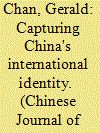

|
|
|
|
|
| Publication |
2014.
|
| Summary/Abstract |
What is China's international identity? How has it changed over time, especially since the reform and opening up of the country in the late 1970s? How does China see itself? And how do other countries see China? I argue that answers to these questions are instrumental to a proper understanding of Chinese foreign-policy behaviour, in ways more significant than we normally assume. To advance this argument, I choose to examine China's social interactions with the outside world to ascertain the evolution of its international identity/identities. I shall trace the domestic sources of China's external policies. In so doing, I hope this article will elucidate the 'debates' between social constructivism and realism as to their relative explanatory power with respect to the making of Chinese international identity. I also hope it will throw light on a possible alternative framework, known as social evolution, for studying China's international relations and its evolving identities.
|
|
|
|
|
|
|
|
|
|
|
|
|
|
|
|
| 13 |
ID:
146996
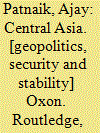

|
|
|
|
|
| Publication |
Oxon, Routledge, 2016.
|
| Description |
xviii, 237p.hbk
|
| Standard Number |
9781138215757
|
|
|
|
|
|
|
|
|
|
|
|
Copies: C:1/I:0,R:0,Q:0
Circulation
| Accession# | Call# | Current Location | Status | Policy | Location |
| 058771 | 327.58/PAT 058771 | Main | On Shelf | General | |
|
|
|
|
| 14 |
ID:
151775
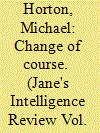

|
|
|
| 15 |
ID:
130607
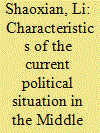

|
|
|
|
|
| Publication |
2014.
|
| Summary/Abstract |
By comparison with the "Arab Spring" that swept through the whole Bregion in 2011 and the political transition evident in many Arab countries in 2012, political development in the Middle East in 2013, to many observers, seemed lost in chaos. Arab countries undergoing political change were plagued by disorder, volatility, and violence. With US. strategic withdrawal from the region imminent, geopolitical dynamics
regrouped. Struggles among regional powers entered a new stage. Four characteristics of the Middle East situation are harbingers for future outcomes: political "ehaos" in the Arab world, "flux and reflux" between moderate and radical lslamists, geopolitical shocks caused by the strategic withdrawal of the U.S. from the region, and continued uncertainty over the Iranian nuclear issue.
|
|
|
|
|
|
|
|
|
|
|
|
|
|
|
|
| 16 |
ID:
110070
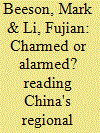

|
|
|
|
|
| Publication |
2012.
|
| Summary/Abstract |
China has rapidly re-emerged as a major regional power in East Asia. Although this represents a return to a long-established historical pattern, the ability of China's political elites to reassure nervous neighbours about the implications of its rise will be a major test of its evolving and increasingly sophisticated foreign policies. In this paper we focus primarily on China's regional engagement strategies, detailing the way such initiatives are understood in China, and the way they are received elsewhere. We focus primarily on the political and economic impacts of China's policies, and briefly consider their reception in Northeast Asia and Southeast Asia. We highlight the different dynamics and issues that China's policymakers must consider in each area, and suggest that despite some difficulties and tensions, on balance, China's policies are proving surprisingly effective.
|
|
|
|
|
|
|
|
|
|
|
|
|
|
|
|
| 17 |
ID:
120538
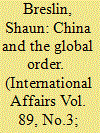

|
|
|
|
|
| Publication |
2013.
|
| Summary/Abstract |
Although there is clear dissatisfaction in China with the nature of the current global order, it is hard to find a clear and coherent Chinese vision of what an alternative world might look like. This is partly a result of conflicting understandings within the country of the benefits and drawbacks of taking a more proactive global role and perhaps undertaking more leadership functions. But it is also a consequence of how elites frame Chinese interests and demands in different ways for different audiences.
Furthermore, the existing order has in fact served China quite well in its transition towards becoming a global power. So while at times China appears to be the main driver for reform and change, at other times (or to other people) the emphasis is on China as a responsible stakeholder in the existing system.
How others receive and interpret these conflicting signals is likely to be influenced by the way China exercises, rather than talks about, its growing power - perhaps most notably in terms of its territorial claims in the South and East China Seas and its role as a regional power.
|
|
|
|
|
|
|
|
|
|
|
|
|
|
|
|
| 18 |
ID:
086687
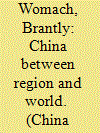

|
|
|
|
|
| Publication |
2009.
|
| Summary/Abstract |
This paper explores three dimensions of China's external relations. First, China can be viewed as a region-state, one in which scale and the diversity of the domestic political economy make it necessary to view the state as an interrelationship of parts even in its external relations. As a sovereign nation, China is a unitary actor unlike international regions, but it is not as uniform an actor as most other states. Second, China is a multi-regional power. Its relationships with the various international regions in which it is a major power are affected by the fact that it is not enclosed by a single region. Lastly, although China is not likely to be in the position of challenging the United States as a global great power in the foreseeable future, its stature as a global presence in a multi-nodal world is already assured. Its global foreign policy of multi-polarity is fundamentally shaped by its situation of being incapable of domination.
|
|
|
|
|
|
|
|
|
|
|
|
|
|
|
|
| 19 |
ID:
130193


|
|
|
|
|
| Publication |
2014.
|
| Summary/Abstract |
In 2013, China's new party and state leadership specified its domestic and foreign policies in the context of Xi Jinping's vision of the ''Chinese Dream.'' A new reform package modifying China's growth and development model has been announced. In foreign policy, a debate has commenced regarding another side of the ''Chinese Dream'': China's rise as a ''Great Power.''
|
|
|
|
|
|
|
|
|
|
|
|
|
|
|
|
| 20 |
ID:
131594
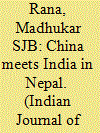

|
|
|
|
|
| Publication |
2013.
|
| Summary/Abstract |
This article attempts to conduct a comprehensive assessment of India and China's interests in Nepal in the wake of the drastic political Nepal since 2006. In this regard, the '6C- Frame of 1 as been employed in the context of Nepal, viz, 1) What are : interests of China and India?; it) What are their conflicting I) What are the areas of cooperation," (iv) What are the areas ' v) How do they diplomatically communicate their T vi) How do they diplomatically coordinate their interests cooperation and minimize con?ict?
|
|
|
|
|
|
|
|
|
|
|
|
|
|
|
|
|
|
|
|
|